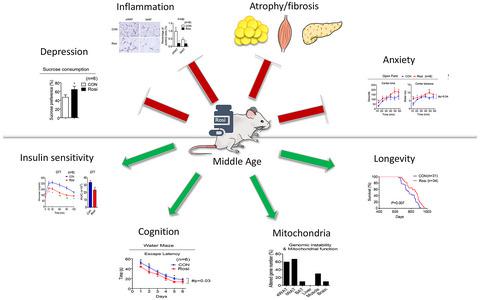当前位置:
X-MOL 学术
›
Aging Cell
›
论文详情
Our official English website, www.x-mol.net, welcomes your feedback! (Note: you will need to create a separate account there.)
PPARγ agonists delay age‐associated metabolic disease and extend longevity
Aging Cell ( IF 7.8 ) Pub Date : 2020-11-21 , DOI: 10.1111/acel.13267 Lingyan Xu 1, 2 , Xinran Ma 1, 2 , Narendra Verma 1 , Luce Perie 1 , Jay Pendse 1, 3 , Sama Shamloo 1 , Anne Marie Josephson 4 , Dongmei Wang 2 , Jin Qiu 2 , Mingwei Guo 2 , Xiaodan Ping 2 , Michele Allen 5 , Audrey Noguchi 5 , Danielle Springer 5 , Fei Shen 6 , Caizhi Liu 2, 7 , Shiwei Zhang 2 , Lingyu Li 7 , Jin Li 8 , Junjie Xiao 8 , Jian Lu 6 , Zhenyu Du 7 , Jian Luo 2 , Jose O Aleman 1, 3 , Philipp Leucht 4 , Elisabetta Mueller 1, 1, 8
Aging Cell ( IF 7.8 ) Pub Date : 2020-11-21 , DOI: 10.1111/acel.13267 Lingyan Xu 1, 2 , Xinran Ma 1, 2 , Narendra Verma 1 , Luce Perie 1 , Jay Pendse 1, 3 , Sama Shamloo 1 , Anne Marie Josephson 4 , Dongmei Wang 2 , Jin Qiu 2 , Mingwei Guo 2 , Xiaodan Ping 2 , Michele Allen 5 , Audrey Noguchi 5 , Danielle Springer 5 , Fei Shen 6 , Caizhi Liu 2, 7 , Shiwei Zhang 2 , Lingyu Li 7 , Jin Li 8 , Junjie Xiao 8 , Jian Lu 6 , Zhenyu Du 7 , Jian Luo 2 , Jose O Aleman 1, 3 , Philipp Leucht 4 , Elisabetta Mueller 1, 1, 8
Affiliation

|
Aging leads to a number of disorders caused by cellular senescence, tissue damage, and organ dysfunction. It has been reported that anti‐inflammatory and insulin‐sensitizing compounds delay, or reverse, the aging process and prevent metabolic disorders, neurodegenerative disease, and muscle atrophy, improving healthspan and extending lifespan. Here we investigated the effects of PPARγ agonists in preventing aging and increasing longevity, given their known properties in lowering inflammation and decreasing glycemia. Our molecular and physiological studies show that long‐term treatment of mice at 14 months of age with low doses of the PPARγ ligand rosiglitazone (Rosi) improved glucose metabolism and mitochondrial functionality. These effects were associated with decreased inflammation and reduced tissue atrophy, improved cognitive function, and diminished anxiety‐ and depression‐like conditions, without any adverse effects on cardiac and skeletal functionality. Furthermore, Rosi treatment of mice started when they were 14 months old was associated with lifespan extension. A retrospective analysis of the effects of the PPARγ agonist pioglitazone (Pio) on longevity showed decreased mortality in patients receiving Pio compared to those receiving a PPARγ‐independent insulin secretagogue glimepiride. Taken together, these data suggest the possibility of using PPARγ agonists to promote healthy aging and extend lifespan.
中文翻译:

PPARγ激动剂延缓与年龄相关的代谢疾病并延长寿命
衰老会导致许多由细胞衰老、组织损伤和器官功能障碍引起的疾病。据报道,抗炎和胰岛素增敏化合物可延缓或逆转衰老过程,预防代谢紊乱、神经退行性疾病和肌肉萎缩,改善健康和延长寿命。鉴于 PPARγ 激动剂在降低炎症和降低血糖方面的已知特性,我们在这里研究了 PPARγ 激动剂在预防衰老和延长寿命方面的作用。我们的分子和生理研究表明,对 14 个月大的小鼠进行低剂量的 PPARγ 配体罗格列酮 (Rosi) 的长期治疗可改善葡萄糖代谢和线粒体功能。这些作用与炎症减少、组织萎缩减少、认知功能改善、并减少类似焦虑和抑郁的情况,对心脏和骨骼功能没有任何不利影响。此外,在小鼠 14 个月大时开始对小鼠进行 Rosi 治疗与寿命延长有关。对 PPARγ 激动剂吡格列酮 (Pio) 对寿命影响的回顾性分析显示,与接受 PPARγ 非依赖性胰岛素促分泌剂格列美脲的患者相比,接受 PIO 的患者死亡率降低。总之,这些数据表明使用 PPARγ 激动剂促进健康衰老和延长寿命的可能性。一项关于 PPARγ 激动剂吡格列酮 (Pio) 对寿命影响的回顾性分析显示,与接受 PPARγ 非依赖性胰岛素促泌剂格列美脲的患者相比,接受 PIO 的患者死亡率降低。总之,这些数据表明使用 PPARγ 激动剂促进健康衰老和延长寿命的可能性。对 PPARγ 激动剂吡格列酮 (Pio) 对寿命影响的回顾性分析显示,与接受 PPARγ 非依赖性胰岛素促分泌剂格列美脲的患者相比,接受 PIO 的患者死亡率降低。总之,这些数据表明使用 PPARγ 激动剂促进健康衰老和延长寿命的可能性。
更新日期:2020-11-23
中文翻译:

PPARγ激动剂延缓与年龄相关的代谢疾病并延长寿命
衰老会导致许多由细胞衰老、组织损伤和器官功能障碍引起的疾病。据报道,抗炎和胰岛素增敏化合物可延缓或逆转衰老过程,预防代谢紊乱、神经退行性疾病和肌肉萎缩,改善健康和延长寿命。鉴于 PPARγ 激动剂在降低炎症和降低血糖方面的已知特性,我们在这里研究了 PPARγ 激动剂在预防衰老和延长寿命方面的作用。我们的分子和生理研究表明,对 14 个月大的小鼠进行低剂量的 PPARγ 配体罗格列酮 (Rosi) 的长期治疗可改善葡萄糖代谢和线粒体功能。这些作用与炎症减少、组织萎缩减少、认知功能改善、并减少类似焦虑和抑郁的情况,对心脏和骨骼功能没有任何不利影响。此外,在小鼠 14 个月大时开始对小鼠进行 Rosi 治疗与寿命延长有关。对 PPARγ 激动剂吡格列酮 (Pio) 对寿命影响的回顾性分析显示,与接受 PPARγ 非依赖性胰岛素促分泌剂格列美脲的患者相比,接受 PIO 的患者死亡率降低。总之,这些数据表明使用 PPARγ 激动剂促进健康衰老和延长寿命的可能性。一项关于 PPARγ 激动剂吡格列酮 (Pio) 对寿命影响的回顾性分析显示,与接受 PPARγ 非依赖性胰岛素促泌剂格列美脲的患者相比,接受 PIO 的患者死亡率降低。总之,这些数据表明使用 PPARγ 激动剂促进健康衰老和延长寿命的可能性。对 PPARγ 激动剂吡格列酮 (Pio) 对寿命影响的回顾性分析显示,与接受 PPARγ 非依赖性胰岛素促分泌剂格列美脲的患者相比,接受 PIO 的患者死亡率降低。总之,这些数据表明使用 PPARγ 激动剂促进健康衰老和延长寿命的可能性。



























 京公网安备 11010802027423号
京公网安备 11010802027423号